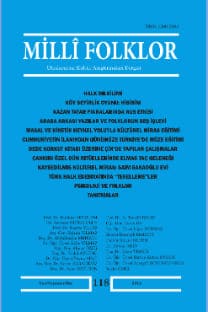‘‘İNSANLAR, GEZEGEN VE REFAH İÇİN BİR EYLEM PLANI’’: SOMUT OLMAYAN KÜLTÜREL MİRAS VE 2030 SÜRDÜRÜLEBİLİR KALKINMA HEDEFLERİNE ELEŞTİREL YAKLAŞIM
An Action Plan for People, Planet and Prosperity: The Critical Approach to the Sustainable Development Goals and Safeguarding of Intangible Cultural Heritage
___
- “Binyıl Kalkınma Hedefleri” www.undp.org/content/turkey/tr/home/mdgoverview/ (Erişim Tarihi: 01.11.2017)
- “Charter on the Preservation of Digital Heritage”. http://portal.unesco.org/en/ev.php-URL_ ID=17721&URL_DO=DO_TOPIC&URL_ SECTION=201.html (Erişim Tarihi: 22.11.2013)
- “Conclusions of the Seventh Annual Regional meeting on Intangible Cultural Heritage in South East Europe”. http://www.unesco.org. tr/dokumanlar/somut_olmayan_km/7_annual_ regional.pdf (Erişim Tarihi:22.11.2013)
- “Culture: Key to Sustainable Development Placing Culture at the heart of Sustainable Development Policies” http://www.un.org/en/ ecosoc/innovfair2013/docs/unesco2.pdf (Eri- şim Tarihi: 22.11.2017).
- “Dünya Kültürel ve Doğal Mirasın Korunmasına Dair Sözleşme” http://www.unesco.org.tr/ dokumanlar/somutkulturelmiras/somut_kulturel_miras.pdf (Erişim Tarihi:22.11.2013)
- D’Eramo, Marco. ‘‘UNESCOCIDE’’. New Left Review 88 (2014):47-53. “European Landscape Convention”. http://conventions.coe.int/Treaty/en/Treaties/Html/176.htm (Erişim Tarihi: 22.11.2013)
- “Draft Amendments To The Operational Directives On Safeguarding, Commercialization And Sustainable Development” https://ich. unesco.org/en/8com Item 13.a (Erişim Tarihi: 29.11.2017).
- Expert meeting on safeguarding intangible cultural heritage and sustainable development https://ich.unesco.org/en/9comnovember-2014-00574 (Erişim Tarihi: 11.11.2017).
- https://ich.unesco.org/en/RL/gada-systeman-indigenous-democratic-socio-politicalsystem-of-the-oromo-01164
- http://www.un.org/sustainabledevelopment/sustainable-development-goals/
- http://www.undp.org/content/undp/en/home/sustainable-development-goals.html
- http://www.surdurulebilirkalkinma.gov.tr/
- https://ich.unesco.org/doc/src/ICH-Operational_ Directives-6.GA-PDF-EN.pdf
- https://ich.unesco.org/doc/src/34299-EN.pdf
- Item 13b Draft amendments to the Operational Directives on safeguarding intangible cultural heritage and sustainable development https://ich.unesco.org/en/10com (Erişim Tarihi: 10.11.2017).
- Item 14a Revision of the Operational Directives for the implementation of the Convention https://ich.unesco.org/en/6.ga Item 7 (Erişim Tarihi: 10.11.2017).
- Oğuz, M. Öcal. Somut Olmayan Kültürel Miras Nedir? Ankara: Geleneksel Yayınları, 2009
- Ölçer Özünel, Evrim. ‘‘Yeni Miras’’lar ve Uluslararası Sözleşmelerde Sürdürülebilir Kalkınma Stratejileri” Millî Folklor 100 (Kış 2013): 14-30.
- “Recommendations of the Chengdu International Conference on the Intangible Cultural Heritage in Celebration of the Tenth Anniversary of the Convention for the Safeguarding of the Intangible Cultural Heritage”.16 Haziran 2013. ITH/13/EXP/8. Chengdu,China. http://www.unesco.org/culture/ich/index. php?lg=en&pg=00482&acti vityID=00055 (22.11.2017).
- Records of the General Conference 38th session Paris, 3 – 18 November 2015 ttp://unesdoc. unesco.org/images/0024/002433/243325e.pdf (Erişim Tarihi: 22.11.2017).
- “Report of the World Commission on Environment and Development: Our Common Future” http://www.un-documents.net/our-common-future.pdf (Erişim Tarihi: 22.11.2017).
- Round-table Chengdu International Conference on the Intangible Cultural Heritage in Celebration of the Tenth Anniversary of the Convention for the Safeguarding of the Intangible Cultural Heritage”.29 Mayıs 2013. ITH/13/EXP/7. Chengdu, China http://www. unesco.org/culture/ich/index.php?lg=en&pg= 00482&activityID=00055 (22.11.2017).
- “Somut Olmayan Kültürel Mirasın Koruması Sözleşmesi”. (Çev. M. Öcal Oğuz, Yeliz Özay ve Pulat Tacar). Millî Folklor. 65 (Bahar 2005): 163-171.
- “The Hangzhou Declaration Placing Culture at the Heart of Sustainable Development Policies”http://www.unesco.org/new/fileadmin/MULTIMEDIA/HQ/CLT/images/Fina lHangzhouDeclaration20130517.pdf (Erişim Tarihi: 16.11.2017)
- Thérond, Daniel. Heritage and Beyond. European Council: Publishing Editions, 2009.
- Timothy J., Dallen. “Tourism and Community Development”. In R. Sharpley and D.J. Telfer (eds) Tourism and Development: Concepts and Issues (2002): pp. 149/164.
- “Transforming our world: the 2030 Agenda for Sustainable Development” Resolution adopted by the General Assembly on 25 September 2015. http://www.un.org/ga/search /view_ doc.asp?symbol=A/RES/70/1&Lang=E. (Eri- şim Tarihi: 01.11.2017).
- “UNESCO’s Work on Culture and Sustainable Development Evaluation of a Policy Theme” http://unesdoc.unesco.org/ images/0023/002344/234443E.pdf (Erişim Tarihi22.11.2017)
- UNESCO. (2014). Intergovermental Committee for the Safeguarding of the Intangible Culture Heritage. Convention for the Safeguarding of the Intangible Cultural Heritage (ITH/14/9.COM/13.b Ninth Session). Paris: UNESCO.
- UNESCO. (2014). Operational Directives for the Implementation of the Convention for the Safeguarding of Intangible Cultural Heritage adopted in 2008 and amended for a fifth time in 2014. Retrieved from: http://www. unesco.org/culture/ich/doc/src/ICH- Operational_Directives-5.GA-EN.docx (Erişim Tarihi: 01.11.2017)
- UNESCO. (2014). Shaping the Future We Want: UN Decade for Education for Sustainable Development (2005-2014) Final Report. Paris: UNESCO.
- UNESCO. (2014). Expert meeting on safeguarding intangible cultural heritage and sustainable development at the national level (ITH/14/EXP/2). Istanbul: UNESCO.
- UNESCO. (2014). Expert meeting on safeguarding intangible cultural heritage and sustainable development at the national level: Background note and agenda (ITH/14/ EXP/1). Istanbul: UNESCO.
- UNESCO. (2014). Envisioning a New Humanism for the 21st Century: New Avenues for Reflection and Action. http://unesdoc.unesco.org/ images/0022/002278/227855e.pdf (Erişim Tarihi: 01.11.2017).
- UNESCO (2013). UNESCO World Heritage and Sustainable Tourism Programme Action Plan 2013-2015. Retrieved from: Sustainable Tourism: http://whc.unesco.org /uploads/activities/documents/activity-669-6.pdf (Erişim Tarihi: 05.11.2017)
- “What Is Sustainable Development?Environm- ental, Economic and Social Well-Being for Today and Tomorrow” http://www.iisd.org/ sd/#one (Erişim Tarihi: 05.11.2017)
- ISSN: 1300-3984
- Yayın Aralığı: 4
- Başlangıç: 1989
- Yayıncı: Geleneksel Yayıncılık Eğitim San. Tic. Ltd. Şti.
KIRK KIZ EFSANESİNİN YAZILI KÜLTÜRDEKİ İKİ ÖRNEĞİ ÜZERİNE BİR DEĞERLENDİRME
BİYOGRAFİ: ETNOGRAFLAR İÇİN YÖNTEM VE ÖNERİLER
TÜRKİYE’DE SOSYAL MEDYANIN M/İZAHI: SOSYAL PAYLAŞIM AĞLARINDAKİ DENEYİMLERİN KARİKATÜRLERE YANSIMASI
KARAMANLI NEOKESARİA KÖYÜNDE DOĞUM GEÇİŞİNE AİT İNANÇLAR
HEKİM FOLKLORUNDA STEREOTİPLERİN LAKAPLARI ŞEKİLLENDİRMESİ VE FIKRALARA YANSIMALARI1
ONUNCU YILINDA SOMUT OLMAYAN KÜLTÜREL MİRAS LİSTELERİ: GÖRÜNÜRLÜK, DEĞERLİLİK VE GÜVENİRLİK
ETNOGRAFİ’DEN NETNOGRAFİ’YE SANAL ORTAMDA KURŞUN DÖKME: “SEN Bİ KURŞUN DÖKTÜR”
SEÇKİNLEŞTİRİLEN EL SANATLARI VE GELENEĞİN SINIRLARI: OLGUNLAŞMA ENSTİTÜLERİ ÖRNEĞİ
KAMUSAL ALAN VE MODERNLEŞME SÜRECİNDE KIBRIS TÜRK KADIN DERNEĞİ: VARLIK KULÜBÜ
